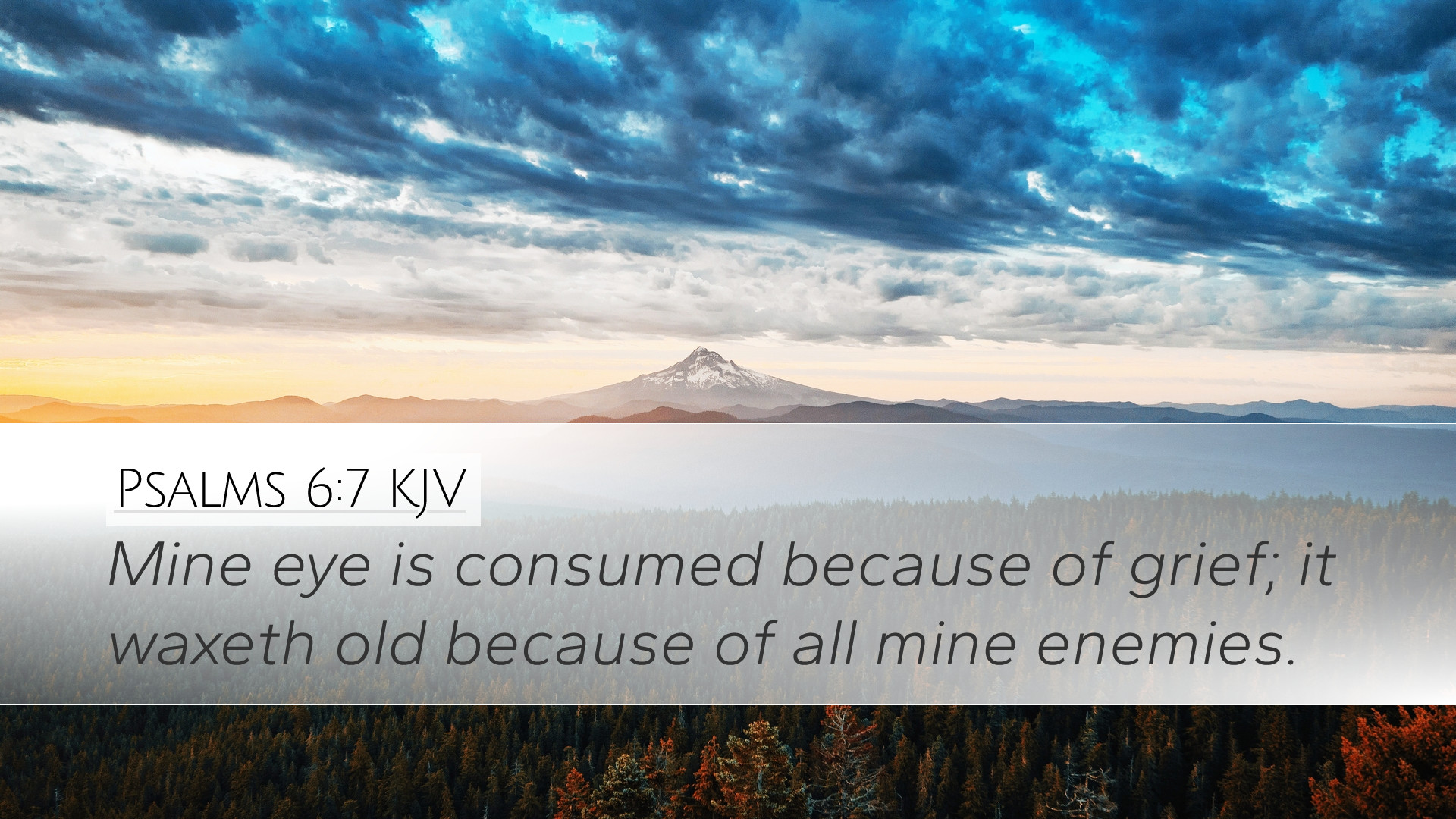Commentary on Psalms 6:7
Verse Reference: Psalms 6:7
"My eye wastes away because of grief; it grows old because of all my enemies."
Introduction
The sixth psalm is categorized among the penitential psalms—a heartfelt expression of penitence and sorrow for sin. In this verse, Psalm 6:7, we see the psalmist's lamentation over his grief and struggles. Scholars and commentators like Matthew Henry, Albert Barnes, and Adam Clarke provide profound insights that enrich the meaning of this verse, revealing the spiritual depth and emotional turmoil experienced by the writer.
Contextual Understanding
This psalm opens with a plea for mercy and healing. It reflects the emotional state of the psalmist, who may be experiencing both physical affliction and spiritual anguish. The context suggests a soul deeply distressed, entreating God for relief. The imagery used in verse 7 communicates a sense of desperation and prolonged suffering that merits careful reflection.
Matthew Henry's Insights
Matthew Henry emphasizes the psalmist's expression of grief, interpreting the "eye" as a symbol of the heart's anguish. He notes:
- Emotional Weight: The eye, which is focused and alert, is now "wasting away" reflecting the totality of the psalmist's emotional burden. This metaphor signifies both tears and weariness from constant lamentation.
- Prolonged Trials: The phrase "grows old" indicates that the grief is not fleeting; it has persisted to the point of wearing the psalmist down. Such continual suffering can lead to a deep sense of hopelessness, which Henry stresses should lead us to seek God earnestly.
Albert Barnes' Commentary
Albert Barnes also tackles the depth of grief reflected in this verse:
- Grief's Impact: Barnes highlights that the ‘eye’ losing strength denotes the physical manifestation of internal anguish, suggesting that sustained sorrow affects one’s whole being—not merely spiritually but physically.
- Enemy Confrontation: He points out that the mention of enemies introduces the idea that external conflict and adversities contribute to internal turmoil, adding layers to the psalmist's suffering.
Adam Clarke's Reflections
Adam Clarke offers a poignant view on the symbolism of the “eye” and its association with the soul's condition:
- Symbol of Awareness: Clarke suggests that the eye represents the psalmist's perception and awareness of his plight—witnessing spiritual and emotional decay.
- Faith's Resilience: Importantly, despite the anguish, Clarke infers that this recognition of sorrow can lead the psalmist closer to God, emphasizing that awareness of suffering can be a precursor to divine intervention.
Theological Implications
This verse encapsulates the human experience of suffering. It has several theological implications that are vital for pastors and theologians to consider:
- The Reality of Grief: It acknowledges that grief is a genuine part of the human experience, one that can lead to a deeper relationship with God.
- God’s Compassion: The plea for God’s attention suggests a belief in His compassion and willingness to intervene in moments of despair.
- Hope in Despair: The dynamic of recognizing suffering but also hoping for relief points to a central theme in psalms—turning despair into hope by calling upon God.
Application for Modern Believers
For contemporary believers, Psalms 6:7 serves as a profound reminder to bring grief and anguish before God:
- Honesty in Prayer: Like the psalmist, believers are encouraged to be honest in their prayers, expressing their struggles and pain to God.
- Community Support: Understanding that grief often arises from relationships and conflicts calls for a community that supports one another through prayer and fellowship.
- Finding Restoration: The psalmist’s journey through grief can help modern Christians recognize that through their struggles, there is the potential for restoration and renewal.
Conclusion
Psalms 6:7 encapsulates the depth of human suffering—a poignant reminder that grief can affect both the body and soul. The insights from Matthew Henry, Albert Barnes, and Adam Clarke aid in understanding this verse's full significance. As believers, it invites us not only to face our pain but also to lean into our faith, trusting that God hears and heals. This psalm remains a timeless source of comfort and guidance for anyone navigating the complexities of grief and seeking solace in the divine.


